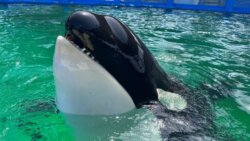For everyone who, over the past year, had been following the progress of the orca Tokitae at the Miami Seaquarium, the news of her sudden death, last week, has been a shock felt around the world.
Plans were actively moving ahead for her to be returned to her home waters in the Pacific Northwest, from where she was captured in 1970. But suddenly, last week, she took a turn for the worse, and despite all medical efforts to help her, she went into renal failure.
 For many years, Toki has led the way in turning public opinion away from using whales and dolphins as a form of entertainment. Pressing most vigorously for her return has always been the Lummi Nation of the Pacific Northwest, for whom she was always “a member of our family under the waves.” Indeed, it was at the request of the Indigenous-led Sacred Lands Conservancy that the Whale Sanctuary Project developed the beginning of an operational plan for them to accomplish this.
For many years, Toki has led the way in turning public opinion away from using whales and dolphins as a form of entertainment. Pressing most vigorously for her return has always been the Lummi Nation of the Pacific Northwest, for whom she was always “a member of our family under the waves.” Indeed, it was at the request of the Indigenous-led Sacred Lands Conservancy that the Whale Sanctuary Project developed the beginning of an operational plan for them to accomplish this.
A new life for Toki began to look increasingly possible in March 2022 when a Mexican company, The Dolphin Company, announced that they had purchased the Seaquarium. Their CEO, Eduardo Albor, even commented that his own daughter had told him that Toki should not be living in a concrete tank.
As confidence grew that she could, indeed, be retired from the Seaquarium, environmentalist and philanthropist Pritam Singh and the Whale Sanctuary Project’s Charles Vinick co-founded the non-profit Friends of Toki organization to collaborate with Albor toward enabling Toki to return home. And Albor agreed to having a team of independent veterinarians assess Toki’s health and prescribe treatment as needed.
Over the next few months, although an underlying condition caused her some occasional relapses, Toki’s health greatly improved. As recorded on the Friends of Toki website, she was increasingly energetic, and her care team of veterinarians and trainers thought she could be moved to a seaside sanctuary in her natal waters.
The need for marine parks to work with the sanctuary movement toward retiring their whales is urgent. As news circulated that she might be returned to her home waters, in March, Jim Irsay, the owner of the Indianapolis Colts football team, stepped forward to lend his leadership and financial support for the work that would be involved.
And so, in the past few weeks – and after 16 months of world-class care from veterinarians and from caregivers who included members of the Whale Sanctuary team – Toki was not only more physically fit, she was also being introduced to her sling for transport and elements of the new environment in which she would live.
But ultimately it was not to be. Following her death, Toki’s body was lifted from the pool by the very sling that would have transported her home. And plans are now underway by the Lummi Nation and others to bring her back to the Pacific Northwest for a traditional farewell.
As news of Toki’s passing continues to spread around the world, the Jane Goodall Institute is calling for an immediate worldwide ban on the capturing, keeping, and breeding of cetaceans in captivity.
The need for sanctuaries across the world is urgent, as is the need for marine parks to work with the sanctuary movement toward retiring their whales.
It is our aspiration for Toki, as her legacy, that the whale sanctuary we’re establishing in Port Hilford Bay, Nova Scotia, be just the first of many more to come.